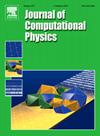Input gradient annealing neural network for solving Fokker-Planck equations with low temperature
IF 3.8
2区 物理与天体物理
Q2 COMPUTER SCIENCE, INTERDISCIPLINARY APPLICATIONS
引用次数: 0
Abstract
We present a novel yet simple deep learning approach, called input gradient annealing neural network (IGANN), for solving stationary Fokker-Planck equations. Traditional methods, such as finite difference and finite elements, suffer from the curse of dimensionality. Neural network-based algorithms are meshless methods, which can avoid the curse of dimensionality. However, at low temperatures, when directly solving a stationary Fokker-Planck equation with more than two metastable states in the generalized potential landscape, the small eigenvalue introduces numerical difficulties due to a large condition number. To overcome these problems, we introduce the IGANN method, which uses a penalty of negative input gradient annealing during the training. We demonstrate that the IGANN method can effectively solve high-dimensional and Fokker-Planck equations with low temperature through our numerical experiments.
求助全文
约1分钟内获得全文
求助全文
来源期刊

Journal of Computational Physics
物理-计算机:跨学科应用
CiteScore
7.60
自引率
14.60%
发文量
763
审稿时长
5.8 months
期刊介绍:
Journal of Computational Physics thoroughly treats the computational aspects of physical problems, presenting techniques for the numerical solution of mathematical equations arising in all areas of physics. The journal seeks to emphasize methods that cross disciplinary boundaries.
The Journal of Computational Physics also publishes short notes of 4 pages or less (including figures, tables, and references but excluding title pages). Letters to the Editor commenting on articles already published in this Journal will also be considered. Neither notes nor letters should have an abstract.
 求助内容:
求助内容: 应助结果提醒方式:
应助结果提醒方式:


